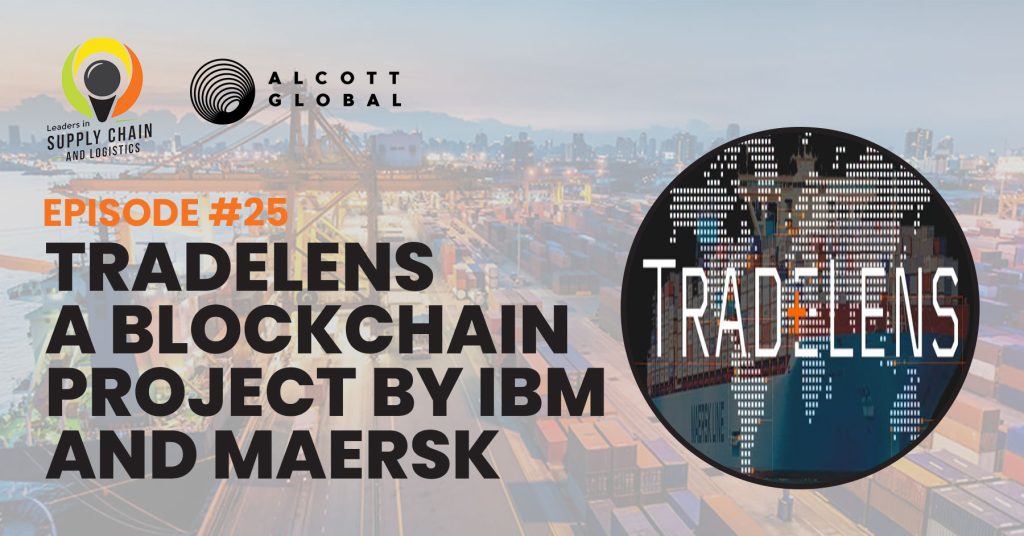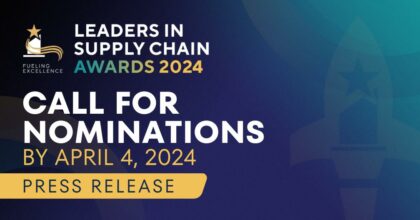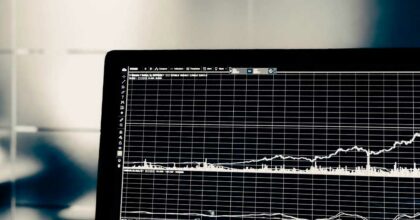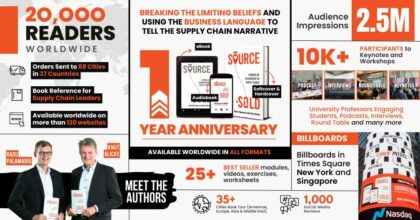The podcast guests are Vijay Anand, Worldwide Sales & Distribution, VP Travel, Transportation & Hospitality – Asia Pacific, G.China, Japan and Todd Scott, VP of Blockchain Global Trade at IBM. The topic of our discussion will be TradeLens, the joint project between A.P. Moller –Maersk and IBM which applies blockchain to the world’s global supply chain. TradeLens is a blockchain-enabled shipping solution designed to promote more efficient and secure global trade, bringing together various parties to support information sharing and transparency. 94 organizations are actively involved or have agreed to participate on the TradeLens platform built on open standards:
- More than 20 port and terminal operators across the globe, including PSA Singapore, International Container Terminal Services Inc, Patrick Terminals, Modern Terminals in Hong Kong, Port of Halifax, Port of Rotterdam, Port of Bilbao, PortConnect, PortBase, and terminal operators Holt Logistics at the Port of Philadelphia, join the global APM Terminals’ network in piloting the solution.
- Pacific International Lines (PIL) have joined Maersk Line and Hamburg Süd as global container carriers participating in the solution.
- Customs authorities in the Netherlands, Saudi Arabia, Singapore, Australia and Peru are participating, along with customs brokers Ransa and Güler & Dinamik.
- BCOs as well as Freight forwarders, transportation and logistics companies including Agility, CEVA Logistics, DAMCO, Kotahi, PLH Trucking Company, Ancotrans and WorldWide Alliance are also currently participating.
Listen to the full discussion here:
- Stream by clicking here.
- Download as an MP3 here.
Connect with the Guest:
Vijay Anand: LinkedIn
Todd Scott: Linkedin
Some of the highlights from the podcast:
- What is blockchain and how TradeLens is using it to tackle the biggest challenges in the industry
- Solving the lack of standards, missing regulations in different countries.
- Security challenges of the system.
- How do they see the alliance moving forward given a number of shipping lines comment that they won’t join because of Maersk?
Show notes:
- [02:16] Before we deep dive into TradeLens, let’s just take a moment to briefly and simply explain to our audience what is blockchain?
- [03:54] Tell us a bit what are the biggest problems that this tool will solve?
- [05:40] Are there some practical case studies you can share with us on solving the lack of standards, missing regulations, no acceptance of Bill of Landing in China and India?
- [07:55] In 2014, Maersk followed a refrigerated container filled with roses and avocados from Kenya to the Netherlands. The company found that almost 30 people and organizations were involved in processing the box on its journey to Europe. The shipment took about 34 days to get from the farm to the retailers, including 10 days waiting for documents to be processed. One of the critical documents went missing, only to be found later amid a pile of paper. How would TradeLens improve this kind of situations?
- [09:45] What can you tell us about the security challenges of the system? Is there a hacking risk?
- [11:04] What can you tell us about the road map – the major milestones and timeline – for TradeLens?
- [14:21] Blockchain is a community effort. If you drive together with one player you will highly unlikely to achieve the desired blockchain. Neutral parties are required. How do they see the alliance moving forward given a number of shipping lines comment that they won’t join because of Maersk?
- [20:35] How do you encourage and motivate more players maritime transportation and logistics community has to adopt the technology?
- [24:55] There has been the problem of corruption across countries. Have you faced this challenge so far and how do you go around to solve it?
- [27:37] From the TradeLens website, is that “the platform is delivered by the IBM Cloud to members around the world.” TradeLens insists, however, that “Blockchain is the core technology that powers TradeLens, ensuring that the data remain secured, permission, and distributed.” If TradeLens lives on IBM’s servers, then IBM can alter the blockchain, withhold data, censor transactions, mine information, etc. There have also been public and private concerns about the neutrality of the solution. How would you comment on this?
- [31:10] What do you hope to achieve in the next 12 months?
- [34:30] Do you think if you get 80% adoption rate throughout the main players in the industry – this could lead to global adoption of the technology?
- [37:20] Would be great to receive the feedback of your audience regarding TradeLens and how we can improve.
About the Host:
The host, Radu Palamariu is the co-author of “From Source to Sold – Stories of Leadership in Supply Chain”. He has been named one of the top 3 Global Supply Chain Influencers on LinkedIn and was featured in Forbes, Bloomberg, WEF, Bangkok Post, and MIT Supply Chain Talent magazine. Radu invites executives to share stories and perspectives around technology, logistics, e-commerce, supply chain, and manufacturing, and their views on how the future will look.
Alcott Global connects and upgrades the supply chain ecosystem by finding the right talent through executive search, developing talent through learning solutions, and meeting supply chain technology needs through a comprehensive crunch base marketplace.
The supply chain executive search has been our focus since the very beginning, offering recruitment services for top-tier supply chain roles at every level of the end-to-end supply chain: plan, source / procure, make, and deliver. Our consultants have years of experience in placing top talent, in North America, LATAM, Europe, the Middle East & Africa, and APAC, and besides speed, one of our biggest strengths is our network within the supply chain industry, and we capitalize on it to find the best solutions.
Through the years, we have grown as an organization and our offerings with it. One of our initiatives, the learning solutions- training and supply chain academy, is focused on transforming leadership- self-leadership, executive presence, influence capital, and business acumen. Through Supplify, we aim to match corporations with the top technology companies to solve their supply chain and logistics challenges with a focus on innovation and digital transformation.
We are in constant touch with the leaders in supply chain, inviting them to inspire the supply chain professionals in thought-provoking podcast episodes and events, and showcasing what is possible at the yearly Leaders in Supply Chain Awards.
Related Episodes:
Episode #05: Tim Wickmann former CEO of MCC Maersk
Episode #22: Sanne Manders COO of Flexport
Episode #24: Blake Larson MD International Lalamove








